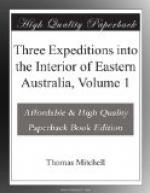The course of the Namoi, as far as it could be traced from the hill, was northward, and the evening being clear, I could perceive very plainly in the same direction, the western extremity of the range, which we had so needlessly endeavoured to cross.
CHAPTER 1.3.
Fires in the Bush.
Rocks of Bullabalakit.
Boat launched.
Bees load my rifle with honey.
Embark on the Namoi in canvas boats.
Impediments to the navigation.
Boat staked, and sinks.
The leak patched.
She again runs foul of a log.
Provisions damaged.
Resolve to proceed by land.
Pack up the boats, and continue the journey.
Pass the western extremity of Nundewar Range.
Unknown tree.
Water scarce.
Providential supply.
Crayfish.
Trap-hill on plains.
Cut through a scrub.
Meet a tribe of Natives.
Again obliged to cut our way.
Fortunate discovery of water.
Dry valleys.
Mount Frazer.
The party in distress for want of water.
Water found next day.
Ducks.
Wheel Ponds.
Excessive heat and drought.
Description of the woods.
Meet with natives.
Cross the dry bed of a river.
A friendly native with his family.
No water.
Reach the Gwydir.
Cross it with one man.
Prevented by a native with spears, from shooting a
kangaroo.
Re-cross the river.
December 23.
This morning all hands were at work. Some good pinetrees were brought to the saw-pit, and one laid upon it. The sailors were set to paint the inside of the canvas for the boats; The Doctor to clear out the dock previous to laying down the keel, etc.; and the bullock-drivers and smith to make a stockyard.
FIRES IN THE BUSH.
At 11 A.M. I discovered the grass near our tents to be on fire, but with the assistance of the people it was fortunately extinguished. All the country beyond the river was in flames, and indeed, from the time of our arrival in these parts, the atmosphere had been so obscured by smoke that I could never obtain a distinct view of the horizon. The smoke darkened the air at night, so as to hide the stars, and thus prevented us from ascertaining our latitude. One spark might have set the whole country on our side in a blaze, and then no food would remain for the cattle, not to mention the danger to our stores and ammunition. Fires prevailed fully as extensively at great distances in the interior, and the sultry air seemed heated by the general conflagration. In the afternoon I took my rifle and explored the course of the river some miles downwards, an interesting walk where probably no white man’s foot had ever trod before. I found a flowery desert, the richest part of the adjacent country being quite covered with a fragrant white amaryllis in full bloom.* The river widened into smooth deep reaches, so that I felt sanguine about our progress with the boats. In returning, I examined the hills on the right bank. One, named Einerguendi by Brown, consisted of compact felspar, coloured green by chlorite, with grains of quartz and acicular crystals of felspar.




